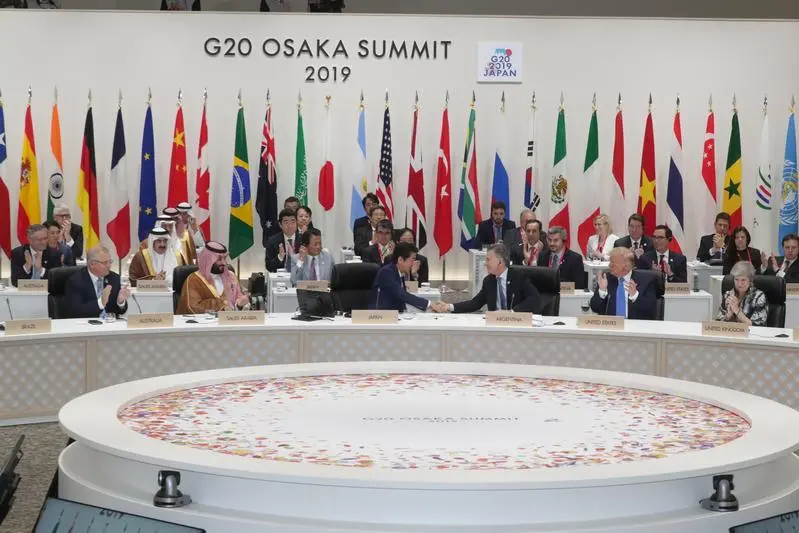PHOTO
Eyesight specialists, such as opticians and optometrists, often give people eye examinations to determine the clarity of their vision. If a person has 20/20 vision, they see at 20 feet (6 meters) what should normally be seen at that distance. If they have 20/10 vision, they see at 20 feet what can normally be seen at 10, giving them enhanced vision.
Similarly, looking with hindsight at the past decade and beyond can potentially provide some foresight for the 2020s. Undoubtedly, one former ophthalmologist at the Western Eye Hospital in London would wish he had the foresight of 2010 today — namely Bashar Assadof Syria, who has presided over a near-decade-long civil war in his country.
For every major achievement mankind has celebrated at the start of each decade of the 21st century, it has also faced subsequent tremendous challenges. While the UN launched the Millennium Development Goalsin September 2000, 12 months later the world witnessed the terrorist attacks of 9/11 and subsequent US war in Afghanistan, which continues to this day.
On Jan. 4, 2010, the Burj Khalifa, the world’s tallest man-made structure, was inaugurated in Dubai — a year to the day before a Tunisian street vendordied from self-immolation, igniting the so-called Arab Spring. As such, disruptive political events, such as the EU referendum in the UK and the US presidential election in 2016, have a genuine propensity to not only recur, but be of a greater magnitude and hence require proactive preparation.
As the world economy becomes more integrated in the 2020s, the digital economy will enhance global access, efficiency and scale, but it runs the risk of increasing detachment from the real economy. Global debt hit a record high of $250 trillionin 2019, according to the Institute of International Finance. And, compared to a gross world product (GWP) of more than $86 trillion in 2019, the planet has a debt-to-GWP ratio of 300 percent (even without the global mainstreaming of cryptocurrencies).
The “Roaring Twenties” came to an end in the West with the devastating Wall Street Crash of October 1929, and so the current imperative to deleverage global debt, thereby reducing its impact on people in the real world, becomes critical. The timeline of the global financial crisis on Wall Street between 2007 and 2008 correlated with riots in Egypt, ignited by soaring food prices. This imperative becomes even more pressing with the realization that, by the mid-2020s, the world population is set to exceed 8 billion people and, by 2022, India could surpass China as the most populous country on Earth.
In contrast, the US in July 2019 marked its longest period of economic expansion in its history, and therefore some can envisage the 2020s as a period of prosperity, akin to the 1920s. This scenario is based on a confluence between technological breakthroughs, which enable hyperconnectivity and hypermobility, while facilitating global trade, wealth creation and entrepreneurship as the drivers of the world economy.
Pending an escalating trade war, China could emerge as the world’s largest economy in the 2020s, with other BRICs nations and the Next Eleven countries also contributing to global growth. This capacity for prosperity should be envisaged in tandem with the equitable redistribution of this wealth, including initiatives such as universal basic income.
Despite technological breakthroughs in the 2020s, history will remain a great teacher — even ancient history. On his return from India and Persia in 323 BC, Alexander the Great of Macedonia ordered his admiral Nearchus to prepare a naval expedition to explore Arabia Felix, the southern region of the Arabian Peninsula. Nearchus prepared the expedition, but Alexander fell ill and passed away before he could set sail.
Last month, Saudi Arabia assumed the annual presidency of the G20 group of countries, which together account for 90 percent of GWP. The Kingdom is the G20’s only Arab member, the location of Islam’s two most holy cities, and the leader of the world’s $6 trillion energy sector. As such, the G20 leaders’ summit in Riyadh in November will mark the first time in human history that Earth’s most powerful leaders have gathered on the Arabian Peninsula — an aspiration even Alexander the Great had.
In the 2020s, space will also return to the global consciousness, harkening back to US astronaut Neil Armstrong landing on the moon half a century ago. As part of the NASA-led Artemisspaceflight program, the first woman and the next man are set to be on the moon by 2024, even landing on the uncharted lunar south pole. Successive missions under Artemis are then envisaged to establish a sustainable human presence on the moon by 2028. Billionaire space entrepreneurs such as Elon Musk of SpaceX, Jeff Bezos of Blue Origin, Richard Branson of Virgin Galactic, and Yuri Milner of Breakthrough Starshot are some of those looking to the stars and beyond, from astrotourism projects to more ambitious endeavors to Mars.
The ubiquitous rise of astrotourism can, in turn, also help enable the globalization of the overview effect. This concept — coined in 1987 by author Frank White — describes the cognitive shift in awareness reported by some astronauts while viewing the Earth from outer space. National borders vanish, conflicts become futile, and the need to protect the planet and its people becomes both obvious and imperative.
As such, the UN celebrates its 75th anniversary in 2020 and also marks a decade until the Global Goals, which aim to end extreme poverty, provide humans with unalienable rights and save the planet from the impacts of climate change, are hoped to be completed.
There can, then, be no better time to experience the overview effect for this decade than now.
- Talal Malik is the CEO of Alpha1Corp, a trusted adviser and dedicated humanitarian.
Copyright: Arab News © 2019 All rights reserved. Provided by SyndiGate Media Inc. (Syndigate.info).





















